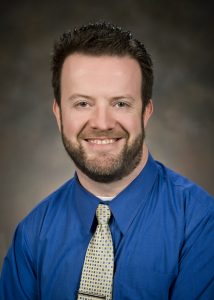
Tom Webb, director of disability services, was selected to participate in the Disability Resource Professional Academy.
Tom Webb, director of disability services at Wright State University, was selected to participate in a national training program designed to improve access to medical education for people with disabilities.
Webb is participating in the Disability Resource Professional (DRP) Academy, a new year-long professional development experience for disability resource professionals to enhance their knowledge of medical education.
Webb will receive training to help others in the field of disability inclusion and accommodation expand their involvement in the health sciences.
“I think the DRP Academy is a wonderful opportunity to build upon Wright State’s commitment to being one of the most accessible and inclusive universities in the country for students with disabilities,” Webb said.
The Disability Resource Professional Academy is organized by the Docs with Disabilities Initiative, which was founded earlier this year with the goal of increasing the number of health care providers with disabilities, addressing access gaps in health care education and practice for people with disabilities, and expanding education and awareness about disability inclusion.
The program is funded by a grant from the Ford Foundation and support from the David Geffen School of Medicine at UCLA and the Coalition for Disability Access in Health Science Programs.
The academy will provide participants with training in critical health science disability resource areas such as the law, clinical accommodations, national medical school examination accommodations and assistive technology.
Webb is one of several participants representing a four-year public university with a medical school. Other universities participating in the academy include the Mayo Clinic, University of California Irvine, Kaiser Permanente and Yale.
The program begins this fall with a series of online discussions about disability accommodations in medical education. Then during the spring semester, Webb will participate in a weeklong program at UCLA’s medical campus.
Initially, Webb plans to focus on learning more about the health sciences and developing potential ways he can work with the Wright State University Boonshoft School of Medicine to help improve its culture and practices to include students with disabilities in the medical school.
Strategies to improve access to medical education could include improving physical accessibility to facilities, removing barriers to marketing materials and student handbooks and encouraging students to disclose their disability status to receive accommodations.
“I hope we will have an opportunity to look at how best to develop inclusive technical standards while still ensuring that the integrity of their accreditation and licensure requirements are upheld,” he said.
The Boonshoft School of Medicine is thrilled Webb was selected to participate in the academy, said Dean Valerie Weber, M.D.
“Wright State is widely known for our inclusive environment for students with disabilities. In medicine, as we strive to provide a diverse workforce to better care for patients with disabilities, programs such as this can help us to better meet these goals,” she said.
Wright State is well-positioned to become a role model for how best to provide opportunities for students with disabilities in the medical and health sciences, Webb said.
“I hope participating in the DRP Academy will provide me with the tools and professional mentors to help Wright State further enhance our welcoming environment for students with disabilities entering medical education,” he said.
Webb said that historically fewer people with disabilities enroll in and complete medical education when compared to other professional and graduate programs nationally. Creating and promoting opportunities for students with disabilities to enter medical school is gaining more attention, he said.
“The disability community often struggles to find medical professionals that experience the same specific health conditions that they seek assistance with managing,” he said. “Producing more doctors with disabilities will be important as we look at how health services more effectively support and treat the 50 million individuals with disabilities living in the United States.”
Webb joined Wright State as the director of the Office of Disability Services in 2014.
Wright State’s Office of Disability Services offers services, programs and activities that allow students with disabilities to participate in all facets of university life, according to their unique abilities and interests. More than 800 students with ADD/ADHD, learning, medical, physical and/or psychological disabilities participate in the office’s programs.
Webb serves on the Ohio Statewide Independent Living Council, which promotes the full access and independence of people with disabilities, and on the board of the local Access Center for Independent Living, which provides services in Montgomery, Greene, Clark and Preble counties.

 Walking through open doors
Walking through open doors  Adventures await
Adventures await  Wright State to expand nursing facilities to meet workforce needs and prepare more graduates for in-demand careers
Wright State to expand nursing facilities to meet workforce needs and prepare more graduates for in-demand careers  Wright State student-athletes make a lasting impact on local family with more to come
Wright State student-athletes make a lasting impact on local family with more to come  Wright State names Rajneesh Suri dean of Raj Soin College of Business
Wright State names Rajneesh Suri dean of Raj Soin College of Business 